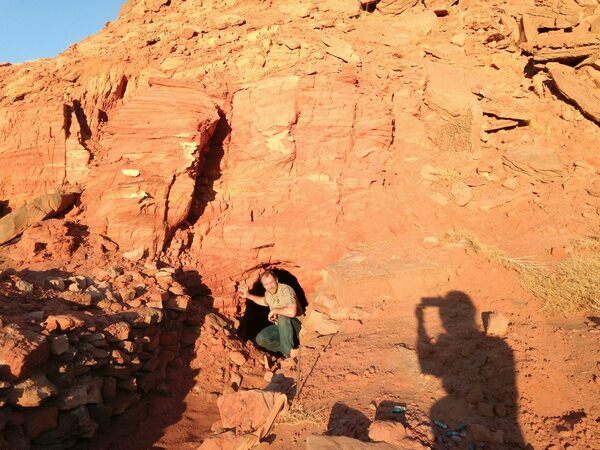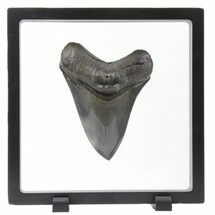Serrated .6" Raptor Tooth - Real Dinosaur Tooth
This is an authentic dinosaur tooth from the Late Cretaceous Kem Kem Beds (formerly Tegana Formation) of Morocco. These small theropod dinosaurs from the Tegana Formation have yet to be described, primarily due to a lack of articulated bone material found in the formation. That means it is impossible to provide a species or even genus ID from these teeth alone.
These small teeth are almost universally referred to as raptor teeth. A paper analyzing isolated teeth from the Kem Kem beds came to the conclusion that only some of these small theropod teeth can be attributed to an unidentified Dromaeosaur (true raptor) while many can be attributed to a yet to be identified Abelisaur. The visual differences between the teeth they attributed to these two families of dinosaurs is very slight, so we prefer to err on the side of caution and label them as simply unidentified.
These small teeth are almost universally referred to as raptor teeth. A paper analyzing isolated teeth from the Kem Kem beds came to the conclusion that only some of these small theropod teeth can be attributed to an unidentified Dromaeosaur (true raptor) while many can be attributed to a yet to be identified Abelisaur. The visual differences between the teeth they attributed to these two families of dinosaurs is very slight, so we prefer to err on the side of caution and label them as simply unidentified.
It comes in an acrylic display case.
The Kem Kem Group
The Kem Kem Group, also known as the Kem Kem Beds, is a significant geological formation located in southeastern Morocco, specifically in the region of the Anti-Atlas Mountains. This formation dates back to the late Cretaceous period, approximately 95 million years ago. The Kem Kem Beds are primarily composed of sandstone, siltstone, and claystone, interspersed with various sedimentary features that indicate a fluvial to deltaic environment.
The Kem Kem Group is renowned for its rich fossil deposits, which include a diverse array of prehistoric fauna. It has yielded a wide variety of dinosaur fossils, including theropods like Spinosaurus and Carcharodontosaurus, as well as large Sauropod dinosaurs such as Rebbachisaurus. Additionally, the beds are home to many other fossilized creatures, including crocodiles, pterosaurs, fish, and a range of invertebrates.
Paleontologists consider the Kem Kem Group an important site for studying late Cretaceous ecosystems and the evolution of vertebrate life. The fossils found in this region have provided valuable insights into the diversity and behavior of prehistoric species, making it a key location for both scientific research and fossil collecting. The striking landscapes of the Kem Kem Beds, with their colorful rock formations and dramatic geological features, also attract geologists and tourists interested in the natural history of the area.
A paper on this assemblage can be found at: Vertebrate assemblages from the early Late Cretaceous of southeastern Morocco: An overview
The Kem Kem Group, also known as the Kem Kem Beds, is a significant geological formation located in southeastern Morocco, specifically in the region of the Anti-Atlas Mountains. This formation dates back to the late Cretaceous period, approximately 95 million years ago. The Kem Kem Beds are primarily composed of sandstone, siltstone, and claystone, interspersed with various sedimentary features that indicate a fluvial to deltaic environment.
The Kem Kem Group is renowned for its rich fossil deposits, which include a diverse array of prehistoric fauna. It has yielded a wide variety of dinosaur fossils, including theropods like Spinosaurus and Carcharodontosaurus, as well as large Sauropod dinosaurs such as Rebbachisaurus. Additionally, the beds are home to many other fossilized creatures, including crocodiles, pterosaurs, fish, and a range of invertebrates.
Paleontologists consider the Kem Kem Group an important site for studying late Cretaceous ecosystems and the evolution of vertebrate life. The fossils found in this region have provided valuable insights into the diversity and behavior of prehistoric species, making it a key location for both scientific research and fossil collecting. The striking landscapes of the Kem Kem Beds, with their colorful rock formations and dramatic geological features, also attract geologists and tourists interested in the natural history of the area.
A paper on this assemblage can be found at: Vertebrate assemblages from the early Late Cretaceous of southeastern Morocco: An overview
$49
SPECIES
Unidentified
LOCATION
Taouz, Kem Kem Basin, Morocco
FORMATION
Kem Kem Beds
SIZE
.6" long
CATEGORY
SUB CATEGORY
ITEM
#300882
We guarantee the authenticity of all of our specimens.
 Reviews
Reviews













